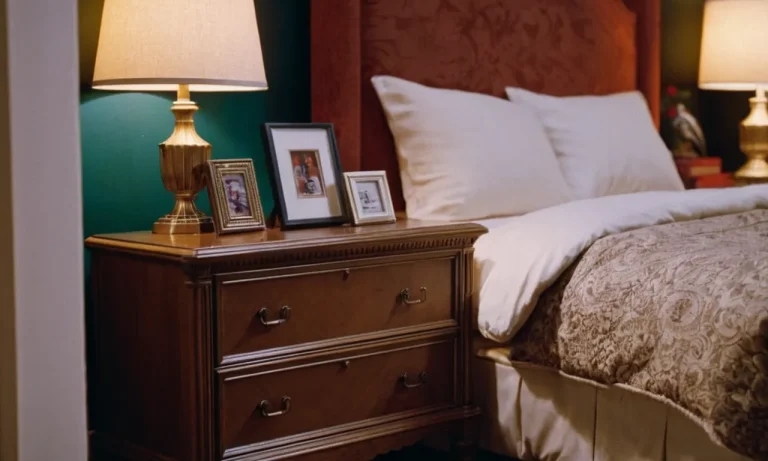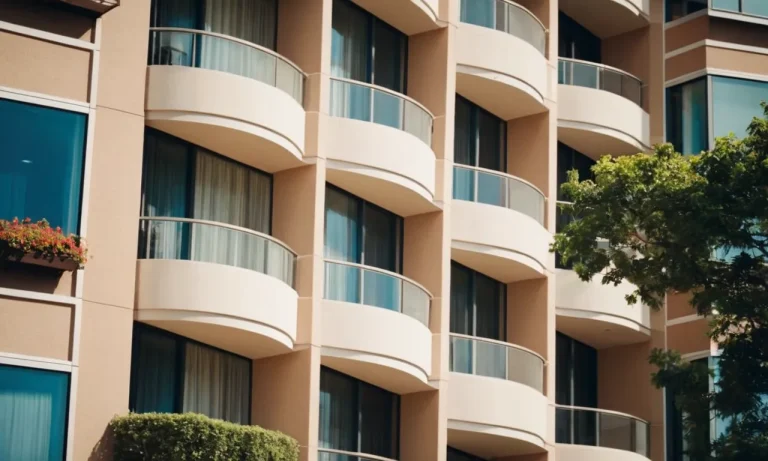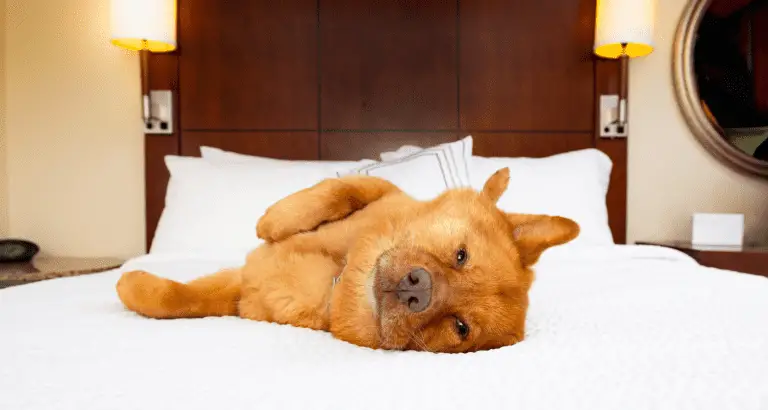How to Cook in a Hotel Without Setting Off the Smoke Alarm
Cooking in a hotel room can be a tempting idea, especially if you’re trying to save money or have specific dietary needs. However, setting off the smoke alarm can quickly turn your culinary adventure into a nightmare.
Imagine the embarrassment of having to explain to hotel staff and fellow guests why the alarm went off, not to mention the potential fines or penalties you might face.
If you’re short on time, here’s a quick answer to your question: To cook in a hotel without setting off the smoke alarm, use cooking methods that produce minimal smoke, such as microwaving, steaming, or using an electric hot plate or portable induction cooktop.
Additionally, open windows and turn on fans to improve ventilation, and keep a close eye on your food to prevent burning or overcooking.
In this comprehensive guide, we’ll explore various techniques and strategies to help you enjoy a delicious home-cooked meal without triggering the smoke alarm. From selecting the right cooking equipment to ventilation tips and recipe recommendations, we’ve got you covered.
Choosing the Right Cooking Equipment
When it comes to cooking in a hotel room without setting off the smoke alarm, choosing the right equipment is crucial. 🔑 Fortunately, there are several options available that can help you whip up delicious meals without causing any fire hazards or disturbances. Let’s explore some of the best choices:
Microwave Ovens
Most hotel rooms come equipped with a microwave oven, making it a convenient and safe choice for heating up pre-cooked meals, reheating leftovers, or even cooking certain dishes. According to a survey by Statista, 92% of American households owned a microwave oven in 2019.
😮 While microwave ovens have their limitations, they can be a lifesaver for quick and easy cooking in a hotel room.
Electric Hot Plates and Portable Induction Cooktops
For those who prefer to cook with pots and pans, electric hot plates and portable induction cooktops can be a great option. These compact appliances are designed for safe and efficient cooking, and they don’t produce any open flames or smoke.
Just remember to crack open a window or turn on the bathroom fan to prevent setting off the smoke alarm. According to EnergyStar, induction cooktops are up to 12% more energy-efficient than conventional electric coil cooktops. 💡
Slow Cookers and Instant Pots
If you’re planning to cook a hearty meal or have some extra time on your hands, slow cookers and Instant Pots can be excellent choices. These versatile appliances allow you to prepare a wide range of dishes, from stews and soups to roasts and even desserts.
They’re also incredibly safe and virtually smoke-free, making them a fantastic option for hotel room cooking. In fact, a study by Statista found that around 83.3 million households in the United States owned a slow cooker in 2020. 🍲
Toaster Ovens
Toaster ovens are another great option for hotel room cooking, especially if you’re craving something crispy or want to bake small batches of treats. These compact ovens can handle a variety of tasks, from toasting bread and bagels to baking pizzas, cookies, and even small casseroles.
Just be sure to keep an eye on your cooking and open a window or turn on the fan to prevent any smoke buildup. According to Statista, around 40% of American households owned a toaster oven in 2019. 🍕
No matter which cooking equipment you choose, always prioritize safety and follow the hotel’s guidelines. With a little creativity and the right tools, you can enjoy delicious home-cooked meals without setting off any alarms or causing any disturbances. 👍 Happy cooking!
Ventilation and Smoke Management
When cooking in a hotel room, proper ventilation and smoke management are crucial to avoid setting off the smoke alarm and creating a smoky mess. Here are some effective strategies to consider:
Opening Windows and Doors
The simplest and most straightforward solution is to open the windows and doors in your hotel room. This allows fresh air to circulate and helps dissipate any smoke or cooking odors. However, be mindful of the weather conditions and potential security concerns when leaving windows or doors open for an extended period.
According to a study by the National Fire Protection Association (NFPA), cooking equipment is the leading cause of hotel and motel fires, accounting for 58% of all reported fires in these establishments. https://www.nfpa.org/News-and-Research/Data-research-and-tools/Building-and-Life-Safety/Hotel-and-motel-fires
Using Fans and Exhaust Systems
Many hotel rooms are equipped with bathroom exhaust fans or ceiling fans that can help circulate air and remove smoke and odors. Turn these on before cooking and keep them running until the smoke has cleared.
If your room doesn’t have a built-in exhaust system, consider bringing a small portable fan to help move air around. 😊 Additionally, you can crack open the bathroom door and turn on the exhaust fan to help draw smoke out of the room.
Covering Smoke Detectors (with Caution)
While not recommended as a primary solution, covering smoke detectors with a plastic bag or cloth can be a temporary measure to prevent them from going off while cooking. However, this should be done with extreme caution and only as a last resort.
Never disable or tamper with smoke detectors permanently, as they are essential for fire safety. 👍 If you choose to cover a smoke detector, ensure it’s done properly and remove the covering immediately after cooking.
Keep in mind that some hotels may have interconnected smoke alarm systems, so covering one detector may not be sufficient.
Remember, prevention is always better than dealing with the consequences of a smoke alarm going off or a potential fire hazard. 🎉 By following these ventilation and smoke management tips, you can enjoy cooking in your hotel room without causing any unnecessary disruptions or safety concerns.
| Ventilation Method | Effectiveness | Precautions |
|---|---|---|
| Opening Windows and Doors | Moderate | Weather conditions, security concerns |
| Using Fans and Exhaust Systems | High | Availability of fans or exhaust systems |
| Covering Smoke Detectors | Low (temporary solution) | Exercise extreme caution, remove covering immediately after cooking |
By combining these methods and exercising caution, you can enjoy a smoke-free and alarm-free cooking experience in your hotel room. Happy cooking! 😍
Low-Smoke Cooking Techniques
Cooking in a hotel room can be a delightful experience, but setting off the smoke alarm can quickly turn it into a nightmare. Fortunately, there are several low-smoke cooking techniques that can help you whip up tasty meals without causing any unwanted commotion. 😋
Steaming
Steaming is a fantastic low-smoke cooking method that allows you to prepare flavorful and healthy dishes. By gently cooking food with hot steam, you can retain essential nutrients while avoiding the production of smoke.
This technique is particularly well-suited for vegetables, fish, and even dumplings. According to Healthline, steaming can preserve up to 90% of the nutrients in vegetables, making it a nutritious choice. 👍
Poaching
Poaching is a gentle cooking method that involves simmering food in a flavorful liquid, such as broth or wine. This technique is perfect for delicate items like eggs, fish, and chicken breasts, as it cooks them evenly without producing any smoke.
Poaching not only preserves the natural flavors of the ingredients but also adds an extra layer of flavor from the poaching liquid. You can find delicious poaching recipes on sites like Food Network.
Baking and Roasting
Baking and roasting are excellent low-smoke options for preparing a wide range of dishes, from savory meats and vegetables to sweet treats like cookies and cakes. These methods rely on dry heat, which minimizes the risk of smoke production.
In fact, according to EPA, cooking with dry heat is one of the best ways to reduce indoor air pollution. 🏆
To ensure a smoke-free experience, be sure to follow the recipe instructions carefully and avoid overcrowding the oven or pan. Additionally, consider using parchment paper or a silicone baking mat to prevent spills and drips that could cause smoke.
Stir-Frying and Sautéing
While stir-frying and sautéing may seem like smoke-prone cooking methods, they can be done with minimal smoke production if you follow a few simple tips. First, make sure your pan or wok is hot enough before adding oil or ingredients.
This will help prevent sticking and burning, which can lead to smoke. Second, don’t overcrowd the pan – cook in batches if necessary. And finally, use a high smoke point oil like avocado or grapeseed oil to minimize smoke. 🥘
If you’re looking for inspiration, check out Serious Eats for their expert tips and tricks on stir-frying and sautéing like a pro.
Meal Planning and Recipe Selection
When cooking in a hotel room, one of the biggest challenges is avoiding setting off the smoke alarm. This can lead to embarrassing situations and potential fines or penalties. The key to preventing this lies in careful meal planning and recipe selection.
By choosing the right ingredients and recipes, you can enjoy delicious meals while keeping the smoke at bay. 😋
Avoiding High-Smoke Ingredients
Some ingredients are notorious for producing excessive smoke when cooked, especially at high temperatures. To minimize the risk of setting off the smoke alarm, it’s best to avoid or limit the use of these ingredients. Here are some examples:
- Oils with low smoke points (e.g., olive oil, butter)
- Fatty meats (e.g., bacon, sausages)
- Spices that tend to burn easily (e.g., cumin, chili powder)
Instead, opt for oils with higher smoke points, such as avocado oil or grapeseed oil, and leaner protein sources like chicken or fish. 👍
Choosing Low-Smoke Recipes
When it comes to recipe selection, look for dishes that are cooked at lower temperatures or involve steaming, poaching, or braising methods. These techniques are less likely to produce excessive smoke. Some examples of low-smoke recipes include:
- Soups and stews
- Salads and sandwiches
- Slow-cooker or Instant Pot meals
- Steamed vegetables and seafood
Additionally, you can find a wealth of smoke-free recipes on websites like FoodNetwork.com and Epicurious.com, which are dedicated to providing low-smoke cooking options.
Meal Prepping and Batch Cooking
Another smart strategy is to meal prep and batch cook in advance. This allows you to do the majority of the cooking at home or in a well-ventilated kitchen, reducing the risk of smoke in your hotel room. Here are some tips for successful meal prepping:
- Cook larger portions and portion them into individual servings
- Utilize your hotel room’s microwave or mini-fridge to reheat or store your prepped meals
- Invest in quality meal prep containers to keep your food fresh
According to a study by NPR, families who meal prepped consumed significantly more fruits and vegetables compared to those who didn’t. This approach not only minimizes smoke but also promotes healthier eating habits. 🎉
By following these strategies for meal planning and recipe selection, you can enjoy delicious, smoke-free meals while staying in a hotel room. Don’t let the fear of setting off the smoke alarm hold you back from cooking amazing dishes! 😍
Safety Considerations and Precautions
Fire Safety and Emergency Procedures
When cooking in a hotel room, fire safety should be your top priority. Always keep a close eye on your cooking to prevent any potential fire hazards. According to the National Fire Protection Association, cooking is the leading cause of home fires and fire injuries, causing an estimated 172,900 fires and 530 civilian deaths per year.
😮 To minimize the risk, never leave your cooking unattended, and keep a fire extinguisher or baking soda nearby in case of grease or electrical fires.
Familiarize yourself with the hotel’s emergency procedures and evacuation routes. Most hotels have detailed instructions and maps posted in each room or hallway. If a fire does occur, don’t risk your safety trying to extinguish it yourself.
Instead, follow the hotel’s evacuation procedures and get to a safe location. Remember, your safety should always come first!
Cleaning and Maintenance
Proper cleaning and maintenance are crucial when cooking in a hotel room. After cooking, thoroughly clean all surfaces and appliances to prevent grease buildup, which can be a fire hazard. Use a degreaser or a baking soda and vinegar solution to cut through stubborn grease and grime.
Don’t forget to clean the microwave, toaster oven, or any other appliances you may have used.
Additionally, be mindful of any damages or malfunctions in the hotel’s cooking equipment. If you notice any issues, report them to the hotel staff immediately. According to a study by Hotel Management, 42% of hotel guests have experienced issues with in-room appliances or amenities.
😕 By reporting any problems promptly, you can help prevent potential safety hazards and ensure a better experience for future guests.
Hotel Policies and Regulations
Before cooking in your hotel room, make sure to review the hotel’s policies and regulations regarding in-room cooking. Some hotels may prohibit certain types of cooking or have restrictions on the use of cooking appliances.
Failure to comply with these policies could result in fines or even eviction from the hotel. 🚫
If cooking is permitted, be considerate of other guests by minimizing any strong odors or smoke that may travel to other rooms. Use the exhaust fan or open a window to ventilate the area. Remember, your actions can directly impact the experience of other guests, so be mindful and courteous.
By following these safety considerations and precautions, you can enjoy a delicious home-cooked meal while ensuring the safety and comfort of yourself and others. Cooking in a hotel room can be a fun and convenient experience, but it’s essential to prioritize safety and follow proper procedures.
Happy and safe cooking! 👨🍳🍽️
Conclusion
Cooking in a hotel room can be a convenient and cost-effective solution, but it’s essential to take the necessary precautions to avoid setting off the smoke alarm. By following the tips and techniques outlined in this guide, you can enjoy delicious home-cooked meals without causing any disturbances or facing potential fines or penalties.
Remember, the key to successful hotel room cooking lies in choosing the right equipment, implementing proper ventilation strategies, and selecting low-smoke cooking methods and recipes. Additionally, always prioritize safety by adhering to fire safety guidelines, maintaining cleanliness, and respecting hotel policies and regulations.
With a little planning and preparation, you can savor the flavors of home-cooked meals while enjoying the convenience of your hotel accommodations. Happy cooking!






